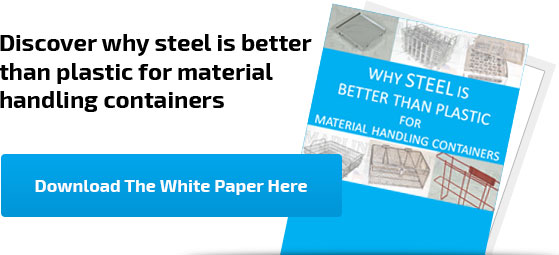 There are a lot of different materials out there that can be used for creating parts handling and washing baskets. When choosing a material for your own custom handling baskets, it’s important to consider all of the characteristics of that material, including:
There are a lot of different materials out there that can be used for creating parts handling and washing baskets. When choosing a material for your own custom handling baskets, it’s important to consider all of the characteristics of that material, including:
- Hardness
- Chemical Resistance
- Temperature Tolerance
- Friction Coefficient
- Flexural Yield Strength and Tensile Strength
By comparing these characteristics of different materials, it’s possible to find a material that is ideal for meeting your unique needs.
Two closely-related materials that get compared a lot are Acetal copolymers and Delrin® homopolymers. Acetal is a common name for a range of thermoplastics that have the chemical name of polyoxymethylene, or POM. Delrin® is a part of the Acetal family of thermoplastics, but has a few distinguishing characteristics.
Which of these two polymers is better for making a materials handling basket?
To answer this question, let’s compare some key performance characteristics of the two polymers:
Hardness
Harder materials are more resistant to being scratched by impacts and abrasion, and tend to have a lower coefficient of friction, making them easier to slide along a conveyor system.
The hardness difference between Acetal copolymers (POM-C) and homopolymers (POM-H) is fairly marginal(85 Shore D versus 86 Shore D). However, the Delrin® homopolymer does tend to have a slightly higher hardness than Acetal copolymer. Additionally, Delrin® AF has a coefficient of friction that is somewhat lower than Acetal.
Chemical Resistance
Acetal has a better resistance to the effects of hot water and strong caustic solutions with a high pH value when compared to Delrin®. This makes Acetal a better choice for parts and materials handling applications involving the use of strong base chemicals.
Temperature Tolerance
Like many plastics, Acetal and Delrin® are not designed for use in high-temperature applications. The melting points of both materials are within 20 degrees Fahrenheit of one another, with Delrin® having the slight edge at 347 degrees Fahrenheit.
However, neither material is recommended for use in processes exceeding 180°F.
Flexural Yield Strength and Tensile Strength
One of the biggest differences between Delrin® and Acetal is that Delrin® tends to have a significantly higher yield strength and tensile strength.
Acetal copolymer tends to have a tensile strength of 9,500 psi, which is impressive for a polymer. Delrin® tops out at 11,000 psi. This allows a structure made from Delrin® to withstand an extra 1,500 psi of force without failing.
The flexural yield strength of these two materials is 12,000 psi for Acetal, and 13,000 for Delrin®.
Which is Best?
While closely matched, there are a few unique characteristics that may make one of these polymers more suited to your needs than the other.
For example, Delrin’s® higher tensile strength and hardness allow for the manufacture of smaller, thinner frames than Acetal while being able to carry the same loads. However, the porosity of Delrin® at its center line make it less ideal for making thicker plates and wires since it can compromise the structural integrity of the finished product.
Acetal’s better chemical resistance to base chemical solutions can make it a better choice for parts cleaning applications. Additionally, Acetal tends to be less expensive, making it the typical economy choice.
However, let’s compare these characteristics to a different material—grade 304 stainless steel:
- Hardness. Steel is a much harder material than plastic, and is measured on a different scale.
- Chemical Resistance. 304 stainless steel is resistant to a variety of chemical mixtures found in many different industries, thanks largely to its protective oxide layer.
- Temperature Tolerance. Stainless steel has a much higher melting point than polymer, roughly 2,550 to 2,650°F, or about 7 times that of Delrin®. This makes steel much more suitable for high-temperature applications.
- Tensile Strength. The ultimate tensile strength of 304 stainless is 73,200 psi—more than five times the strength of either Acetal polymer.
These properties make for a much stronger parts handling basket, one that will carry heavier loads and last much longer than a polymer one could.
When picking a perfect materials handling basket material, keep in mind the performance characteristics of each material in relation to the demands of your manufacturing process. Doing so can make for a stronger, more effective custom basket.



.gif)


